Looking back on the Rio Olympics
Published on August 20th, 2020
Four years ago, Scuttlebutt editor Craig Leweck was in Brazil to report on the Rio 2016 Olympics. With the Tokyo 2020 Games postponed until 2021, we keep that Olympic Flame alive through Leweck’s observations from the Carioca nation… here was his fourteenth report:
San Diego, CA (August 21, 2016) – I had the privilege of being host for the World Sailing Live Blog during the 2016 Olympic Games. Working at the Sailing venue in Rio de Janeiro, I was challenged to share, in the most simplest of media formats, the most complex of competitions.
Eleven days in a row, ten events, thirty medals won. It was an emotional, draining experience which brought me close to the Games. As I reflect, here are my three favorite moments:
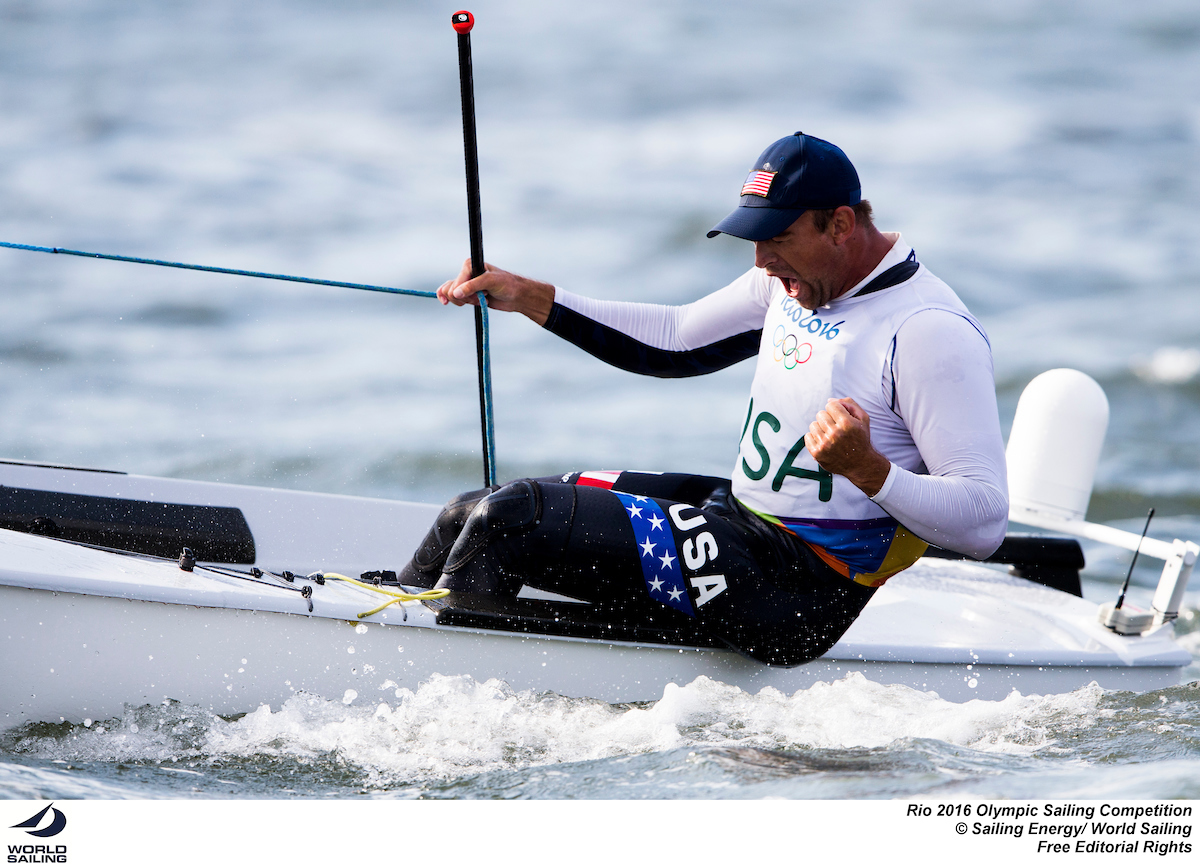
Caleb Paine (USA), Finn Bronze Medal
After Caleb finished the third day of racing, and with two more qualifying race days to go, he was sitting in fourth position. But later that day he got disqualified, falling a likely unrecoverable distance from the podium.
It was heartbreaking, but when it was learned that video evidence existed to refute the protestor’s claim, wheels were put into motion to reopen the case. After three straight days in front of the jury, Caleb’s position in the disputed race, a second, was re-established.
Caleb entered the Medal Race again in fourth, just behind the boat that had protested him. As the early leaders dug left, Caleb split right. When he sought to consolidate, he still trailed, so he dug right again. He said the right looked good at the start, so he was going all in.
Two thirds up the beat, he got his payday. His lead would be unchallenged, giving him a wire to wire victory. As for the protestor, whose earlier claim against Caleb nearly earned him a misconduct (Rule 69) hearing, sometimes Karma comes back with a vengeance. The sailor finished last in the Medal Race, dropping to fifth in overall.
The US Sailing Team had been eager to join again the medal count. Since 1932, American sailors have won medals in every Olympic regatta in which they’ve competed, but not in 2012. Coming into Rio, they had no medal favorites, just a few possibilities.
Caleb was a long shot. He had committed to the Finn in his late teens, and at age 25, Rio was his first Games. Of all the team members, he was the least funded. But his dedication at a young age is now the model the US Team is advocating, and the country got their poster child for the cause.
Santiago Lange/ Cecilia Carranza Saroli (ARG), Nacra 17 Gold Medal
I have known Santi a long time, dating back to our early days in the Snipe class. He entered the Olympics with a big story, having lost a lung to cancer, his sons were racing the 49er Men event, and well, Santi at 54 years was the oldest person in the Sailing competition.
He is a very thoughtful and kind person, and I know his victory was in just competing, but Santi and Cecilia entered the Medal Race with a five point lead over Italy.
Sadly, the storybook Games looked to be over at the start. With most of the fleet starting on port, the Argentines failed to execute with a port-starboard foul requiring a penalty turn. Rounding the first windward mark in last, they had fully fallen off the podium.
But Santi reached into his war chest, moving up to sixth at the leeward mark with one lap to go. But disaster struck again at the final upwind mark as they fouled Austria. Could they still win gold after two fouls and two penalty turns? Yes, with one point to spare.
I attended the Medal Ceremony, and to the side of me was Torben Grael, who beyond his five Olympic medals for Brazil, was also an old time Snipe sailor who so often was competing against Santi for world titles. Torben looked so pleased to see what his old friend had done. On this day, the Nacra 17 Medal Race was the fourth and final contest, putting the exclamation mark on what had been an epic display of competition.
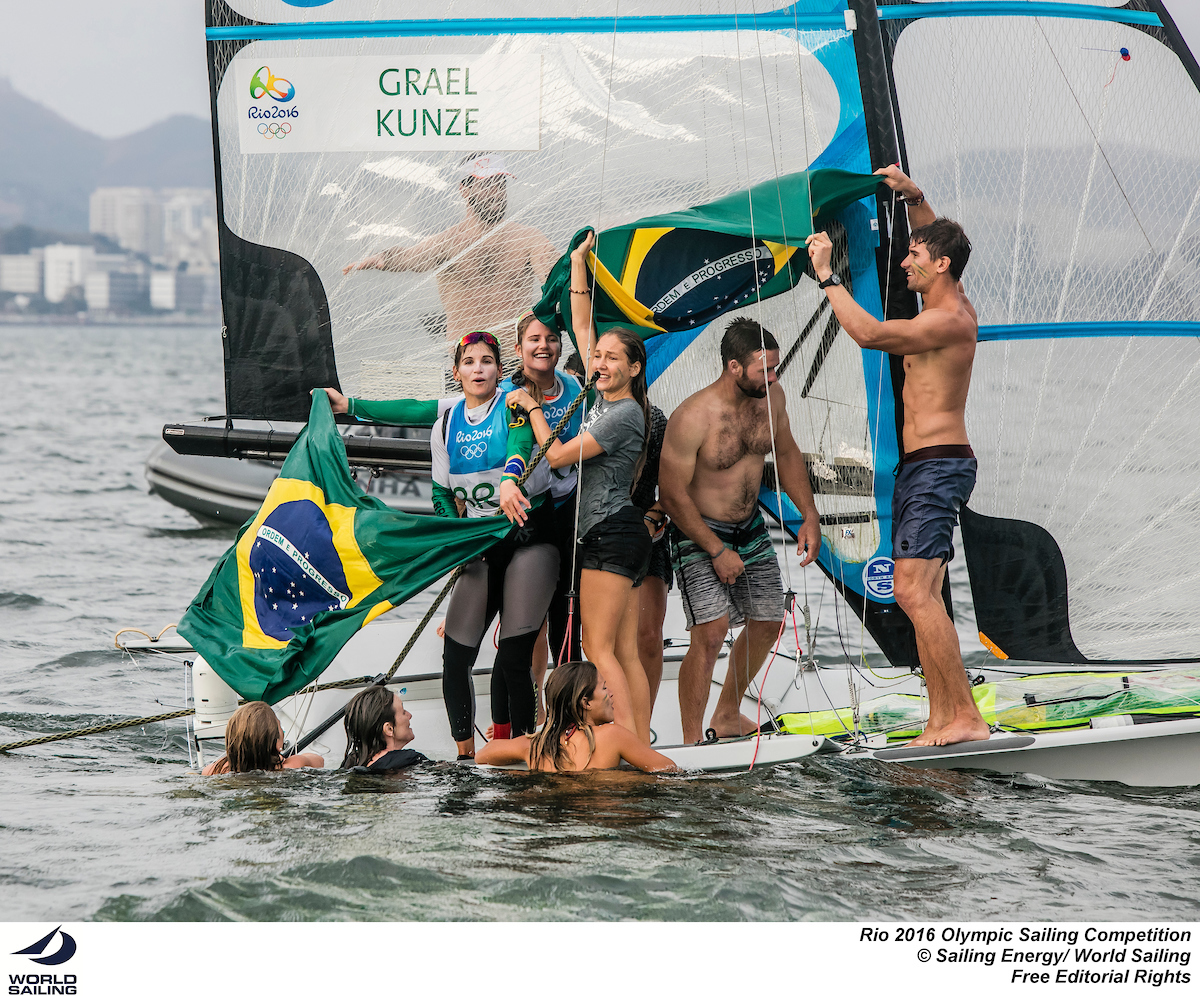
Martine Grael/ Kahena Kunze (BRA), 49erFX Gold Medal
This was the final day of the Sailing competition, and Brazil had yet to win a Sailing Medal. For a country that had been under so much pressure to host the Games, and for an event that is so respected within the country, the 49erFX Medal Race was their last chance to stand on the podium.
But any medal would not come easy as four 49erFX teams – Brazil, Denmark, New Zealand, and Spain – were within one point of gold in a winner take all finale. Martine and Kahena, along with Alexandra Maloney and Molly Meech (NZL), got off the start line best, with the Kiwis taking the lead. Brazil chased after two laps, and got a split gate for the final upwind leg. Brazil got enough separation, and a shift, to take the lead at final upwind mark.
The two teams, hitting 16 knots, dueled to the finish. It was brilliant television. The Kiwis would settle for silver while Jena Mai Hansen and Katja Salskov-Iversen (DEN) held bronze around the track. Left off the podium, yet leading before Medal Race, was Tamara Echegoyen and Berta Betanzos Moro (ESP).
I must admit I was keen on the Kiwis to win, only because I had seen them often during the competition, and they had appeared so relaxed and spirited. Competing at a high level, but being open and casual on land, ranks high with me. But I loved the Brazilian story too, particularly as Martine and Kahena had been quite dominant mid-quad, but that the top teams had gotten quite even coming into the Games.
When Martine and Kahena won, no other team could have matched the exuberance that followed. It was utter pandemonium on the water and onshore The mania wouldn’t end. After they were awarded their medals, the girls were pinging off the crowd, running all about, giving back the love they were receiving. It was the most honest, authentic, and unbridled medal moment of the Games.
The seven race areas were deemed to be the most complex of any previous Games, which had prompted the top nations to invest significant time training at the venue to better understand the patterns. But at the press conference, Martine shred a sentiment that I suspect every athlete wished they’d known weeks ago, months ago, years ago.
“I heard how some teams developed a playbook for how to sail here,” she noted. “But this is Rio. Every area is different and every day is different. If we had a local advantage, it is because we knew to believe in what we see, not what we read in a playbook. Sure, there are subtleties that we recognize, but mostly we knew to trust ourselves. That, I think, is a good approach for everywhere, and not just Rio.”
Thank you Martine and Kahena (below) for giving the 31st Olympiad its most memorable moment.
Event details – Results – Photos
Racing was staggered among the 10 events from August 8 to 18, with August 19 as a spare day if needed. It wasn’t.


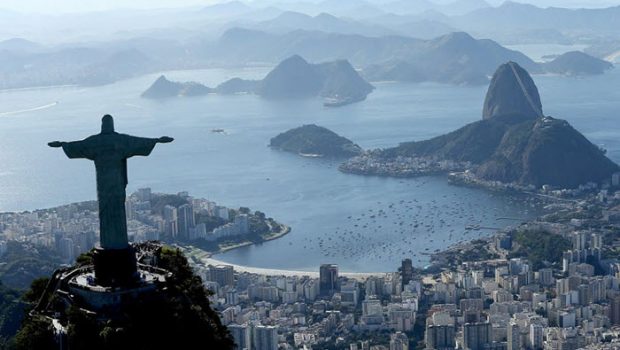



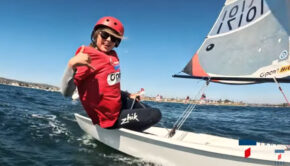

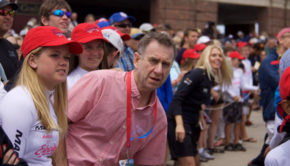
 We’ll keep your information safe.
We’ll keep your information safe.